仁爱英语七年级下册-Unit 7 The Birthday Party知识点讲解
2018仁爱英语七下Unit7The Birthday Party Topic3语言点
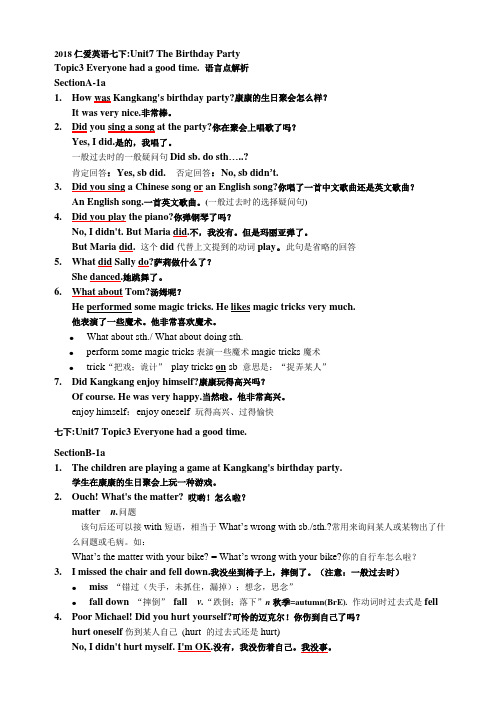
2018仁爱英语七下:Unit7 The Birthday PartyTopic3 Everyone had a good time. 语言点解析SectionA-1a1.How was Kangkang's birthday party?康康的生日聚会怎么样?It was very nice.非常棒。
2.Did you sing a song at the party?你在聚会上唱歌了吗?Yes, I did.是的,我唱了。
一般过去时的一般疑问句Did sb. do sth…..?肯定回答:Yes, sb did. 否定回答:No, sb didn’t.3.Did you sing a Chinese song or an English song?你唱了一首中文歌曲还是英文歌曲?An English song.一首英文歌曲。
(一般过去时的选择疑问句)4.Did you play the piano?你弹钢琴了吗?No, I didn't. But Maria did.不,我没有。
但是玛丽亚弹了。
But Maria did. 这个did代替上文提到的动词play。
此句是省略的回答5.What did Sally do?萨莉做什么了?She danced.她跳舞了。
6.What about Tom?汤姆呢?He performed some magic tricks. He likes magic tricks very much.他表演了一些魔术。
他非常喜欢魔术。
●What about sth./ What about doing sth.●perform some magic tricks表演一些魔术magic tricks魔术●trick“把戏;诡计”play tricks on sb 意思是:“捉弄某人”7.Did Kangkang enjoy himself?康康玩得高兴吗?Of course. He was very happy.当然啦。
仁爱版英语七年级下册Unit7 Topic3 知识点总结

Unit 7 The Birthday PartyTopic 3 Everyone had a good time.Section A 重点词组句子1.唱一首英文歌 sing an English song 唱一首中文歌 sing a Chinese song2.表演魔术 perform magic tricks3.弹钢琴play the piano4.玩得愉快(enjoy) enjoy oneself=have fun=have a good time5.跳迪斯科 dance to disco6.在生日聚会上 at the birthday party7.弹吉他play the guitar 8.表演中国功夫perform Chinese kung fu1.---康康的生日聚会怎么样?---非常好。
---How was Kangkang’s birthday party? --- It was very nice.2. ---你在晚会上唱歌了吗? ---是的。
--- Did you sing a song at the party ? ---Yes, I did.3. 你唱了一支中文歌还是一支英文歌?Did you sing a Chinese song or an English song?4.他表演了一些魔术。
He performed some magic tricks.5.---康康玩得高兴吗? ---当然了。
他很开心。
---Did Kangkang enjoy himself? --- Of course. He was very happy.6.康康表演了中国功夫。
Kangkang performed Chinese kung fu.Section B 重点词组句子1.做游戏 play a game/ play games2.摔倒,滑到 fall down3.伤了某人自己 hurt oneself4.洗手wash one’s hands5.立刻,马上 at once6.害怕,恐怕 be afraid +that从句 be afraid to do sth.害怕做某事 be afraid of +名词害怕某物7.忘了时间 forget the time 忘记去做某事forget to do sth. 忘记做过某事forget doing sth.8.早点回来 come back early9.下次next time 10.告诉某人去做某事tell sb. to do sth.告诉某人某事 tell sb. sth 告诉某人关于某事tell sb. sth. about sth. 11.昨晚last night1.---怎么啦? ---我没坐到椅子上,摔倒了。
仁爱英语七年级下unit7知识要点

七年级下U7 The Birthday PartyTopic1 When is your birthday?一﹑单元重点:1.学习be动词的过去式was, were。
2.学习月份的词并掌握日期的表达方式。
3.学会使用表示时间的介词in, on, at。
4.基数词与序数词的用法。
5.学习日期的表达和读法及如何询问日期.What’s the date?6.描述事物的形状﹑尺寸和用途等。
7.句型It’s +数词+long/wide/tall等。
8.句型buy sth. for sb.二﹑词与词组:1.talk about谈论2.know about了解3.the rest 其余4.plan to do sth.计划做…5.have a party举行晚会6.be born 出生7.a model plane模型飞机8.how long 多长9.buy sth. for sb.买…给…=buy sb. sth10.a surprise一个惊喜11.do some cleaning打扫卫生12.a big fan of …的超级粉丝(…迷)13.sports star体育明星14. be like像…15.月份:(注:月份的首字母要大写)16.表示形状的词:三﹑重要句型:1. What’s the date today? It’s may 8.2. What’s the shape of your present? It’s round.3. What shape is it? It’s rectangle.4. How long(长)/wide(宽)/tall(身高)/high(高度)/deep(深)+is it?5. What do we use it for? We use it to study English.6.It must be an English learning machine.7.Here is a present for you.四﹑语法:一般过去式(past simple)表示过去某个时间发生的动作或存在的状态,常与yesterday/last year/just now/in 1990/in those days/a few days ago/two weeks ago 等表示过去的时间状语连用;一般过去式也表示过去经常或反复发生的动作,如:1. When were you born? I was born in June,19702. Were you born in India? Yes,I was, No,I wasn’t.3. Where was she born? She was born in America.4. When was your daughter born? She was born on October 22nd 1996.五﹑重要知识点:时间介词in/on/at用法介词in/on/at可以用于表示时间的名词前,有“在”的意思,用法如下:1)at用于钟点时刻前,意思为“在--- 时(刻)”,如at three O’clockat a quarter to six at noon at nightat midnight at this time of day2)in 用于泛指一天的上午,下午,晚上等,也用于某个较长的时间,如年,月,季节等,如:in the morning/afternoon/evening in 2003, in theday/daytime.In还可以表示“从现在起一段时间以后”in a week3)on用于表示在具体的某一天以及某天的某段时间,如:on Sunday /on Children’s day /on the night of new year,on the morning/afternoon/evening of /on Sunday morningTopic2 Can you sing an English song?一﹑单元重点:1.掌握情态动词can/can’t及其过去式could/couldn’t的用法。
仁爱版英语七年级下册 Unit 7 The Birthday Party 单元总复习 课件(共20张
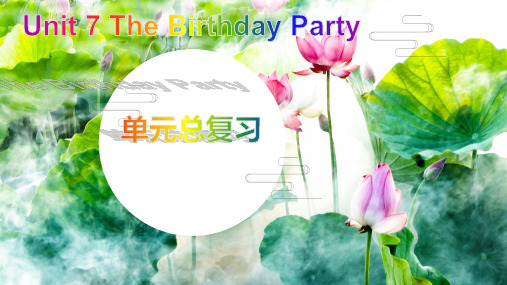
at once 立刻 last night 昨晚 next time 下次 by hand 用手 in the past 过去 at the age of 在...岁 with one’s help 在...帮助下 so many 如此多 not…any more 不再
贰
APRT ONE
重点句型
at Kangkang’s birthday party 在康康的生日聚会
dance to disco 跳迪斯科
play the guitar 弹吉他
play the piano 弹钢琴 play erhu 拉二胡 play a game 玩游戏 perform Chinese Kungfu 表演中国功夫 perform magic tricks 变魔术 perform ballet 表演芭蕾
9._I_’__m__s_u_r_e__w_e_’__l_l__h_a_v_e__a__g_o_o_d__time at the party. 我确定我们在集会上玩得高兴。 10.__Yo_u__a_r_e_s_o_s_m__a_rt_!_______________你真聪明! 11._I_’__d__l_i_k_e__t_o__t_a_k_e__t_h_e_s_e__f_l_ow_e_r_s to the party.
talk about 谈论 place of birth 出生地 date of birth 出生日期 after class 下课 big fan 狂热粉丝 have a birthday party 举行生日聚会 have a look 看 make a cake 做蛋糕 do some cleaning 打扫 cook a big dinner 做一顿丰盛的晚餐
仁爱版英语七年级下册unit7重难点知识归纳总结
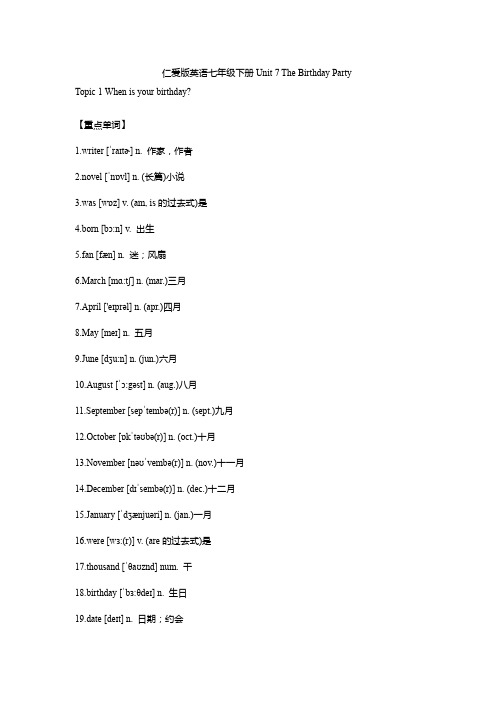
仁爱版英语七年级下册Unit 7 The Birthday Party Topic 1 When is your birthday?【重点单词】1.writer [ˈraɪtɚ] n. 作家,作者2.novel [ˈnɒvl] n. (长篇)小说3.was [wɒz] v. (am, is的过去式)是4.born [bɔ:n] v. 出生5.fan [fæn] n. 迷;风扇6.March [mɑ:tʃ] n. (mar.)三月7.April ['eɪprəl] n. (apr.)四月8.May [meɪ] n. 五月9.June [dʒu:n] n. (jun.)六月10.August [ˈɔ:gəst] n. (aug.)八月11.September [sepˈtembə(r)] n. (sept.)九月12.October [ɒkˈtəʊbə(r)] n. (oct.)十月13.November [nəʊˈvembə(r)] n. (nov.)十一月14.December [dɪˈsembə(r)] n. (dec.)十二月15.January [ˈdʒænjuəri] n. (jan.)一月16.were [wɜ:(r)] v. (are的过去式)是17.thousand [ˈθaʊznd] num. 千18.birthday [ˈbɜ:θdeɪ] n. 生日19.date [deɪt] n. 日期;约会20.calendar [ˈkælɪndə(r)] n. 日历21.plan [plæn] v. &n. 计划,打算22.celebrate ['selɪbreɪt] v. 庆祝23.party ['pɑ:tɪ] n. 聚会,宴会;党派24.fourth [fɔ:θ] num. 第四25.fifth [fɪfθ] num. 第五26.sixth [sɪksθ] num. 第六27.seventh ['sevnθ] num. 第七28.eighth [eɪtθ] num. 第八29.ninth [naɪnθ] num. 第九30.tenth [tenθ] num. 第十31.eleventh [ɪ'levnθ] num. 第十一32.twelfth [twelfθ] num. 第十二33.twentieth ['twentɪəθ] num. 第二十34.present ['preznt] n. 礼物35.shape [ʃeɪp] n. 形状v. 使成为……形状36.ball [bɔ:l] n. 球;舞会37.afraid [əˈfreɪd] adj. 担心;害怕38.star [stɑ:(r)] n. 星;明星39.mouse [maʊs] n. 老鼠40.square [skweə(r)] n. 正方形;广场;平方adj. 正方形的41.circle ['sɜ:kl] n. 圈,圆圈v. 圈出42.triangle ['traɪæŋɡl] n. 三角形43.rectangle [ˈrektæŋgl] n. 长方形;矩形44.oval ['əʊvl] n. 椭圆adj. 椭圆形的45.centimeter ['sentɪˌmi:tə] n. (cm)厘米46.Mrs. [ˈmɪsɪz] n. 太太,夫人47.cake [keɪk] n. 蛋糕【重点短语】1.be born 出生2.look at 看3.plan to do sth. 计划做某事4.have a birthday party 举办生日聚会5.the shape of ……的形状6.be like 像……7.how long 多长8.how wide 多宽e ... for ... 用……做……【重点句型】1.—When were you / was he/she born?你/他/她是什么时候出生的?—I/He/She was born on/in …我/他/她出生于……2.—Where were you / was he/she born?你/他/她在哪里出生的?—I/He/She was born in …我/他/她出生在……3.—When is your birthday?你的生日是什么时候?—May 13th.5月13号。
仁爱七下Unit7ThebirthdaypartyTopic3Everyonehadagoodtime知识点

仁爱七下Unit 7 The birthday party Topic 3 Everyone had a good time.I. 语言点Section A1. perform ballet , dance the disco , recite a Chinese poem, at the party, magic tricks2. You speak Chinese very well.well 副词, 在这修饰动词speak. He does well in his English.作形容词时作身体好: — How are you? — V ery well.3. Did Kangkang enjoy himself ?enjoy 喜欢 enjoin +sth.喜欢某物 He enjoyed English.enjoy +doing sth. 喜欢做某事 I enjoying playing basketball.enjoy + oneself =have a good/nice/wonderful time过得高兴,玩得开心We enjoyed ourselves yesterday.=We had a good time yesterday.Section B1.What’s the matter?=What’s wrong? = What’s up? 怎么了?(什么事?)2. I missed the chair and fell down. 我没坐到椅子,摔倒了。
miss 在这里有“错过”的意思 fall down摔倒3. Did you hurt yourself? 你伤到你自己了吗?hurt adj. (身体上)受伤的 v. 伤害;受伤;感到疼痛 hurt oneself伤了某人自己4.Go and wash them at once.and在这里表并列关系,前后两个动词形式要一致 at once = right now立刻,马上5.What happened to Michael at the party? Michael 在聚会上怎么了?happen to sb.(事件)发生在某人身上a).I want to know what happened to Jane.我想做的Jane发生了什么事b).What happened to sb./sth.某人/事怎么了?相当于What’s the matter with sb./sth.或What’s wrong with sb./sth.Section C1.His parents bought lots of food and drinks for us. 他父母给我们买了许多食物和饮料。
仁爱英语七下Unit7-topic1重要知识点和语法点归纳
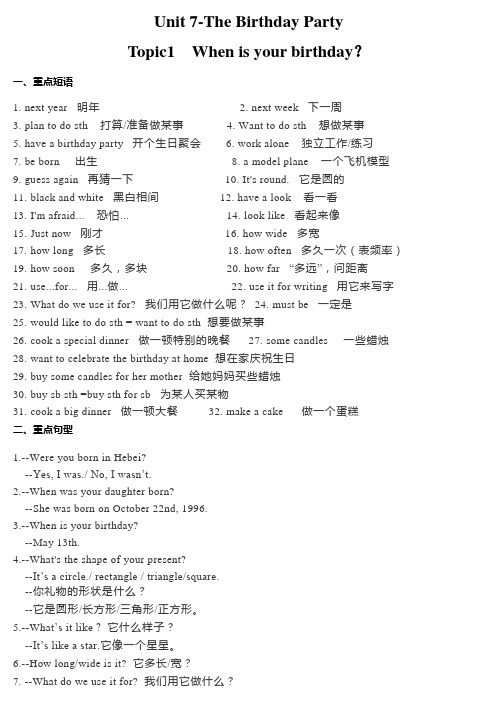
Unit 7-The Birthday PartyTopic1 When is your birthday?一、重点短语1. next year 明年2. next week 下一周3. plan to do sth 打算/准备做某事4. Want to do sth 想做某事5. have a birthday party 开个生日聚会6. work alone 独立工作/练习7. be born 出生8. a model plane 一个飞机模型9. guess again 再猜一下10. It's round. 它是圆的11. black and white 黑白相间12. have a look 看一看13. I'm afraid... 恐怕... 14. look like 看起来像15. Just now 刚才16. how wide 多宽17. how long 多长18. how often 多久一次(表频率)19. how soon 多久,多块20. how far “多远”,问距离21. use...for... 用...做... 22. use it for writing 用它来写字23. What do we use it for? 我们用它做什么呢?24. must be 一定是25. would like to do sth = want to do sth 想要做某事26. cook a special dinner 做一顿特别的晚餐27. some candles 一些蜡烛28. want to celebrate the birthday at home 想在家庆祝生日29. buy some candles for her mother 给她妈妈买些蜡烛30. buy sb sth =buy sth for sb 为某人买某物31. cook a big dinner 做一顿大餐32. make a cake 做一个蛋糕二、重点句型1.--Were you born in Hebei?--Yes, I was./ No, I wasn’t.2.--When was your daughter born?--She was born on October 22nd, 1996.3.--When is your birthday?--May 13th.4.--What's the shape of your present?--It’s a circle./ rectangle / triangle/square.--你礼物的形状是什么?--它是圆形/长方形/三角形/正方形。
2018仁爱英语七下Unit7The Birthday Party Topic2语言点
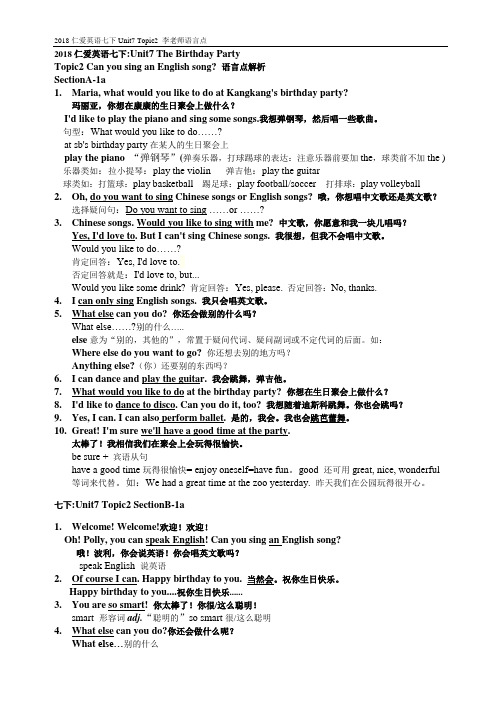
2018仁爱英语七下:Unit7 The Birthday PartyTopic2 Can you sing an English song? 语言点解析SectionA-1a1.Maria, what would you like to do at Kangkang's birthday party?玛丽亚,你想在康康的生日聚会上做什么?I'd like to play the piano and sing some songs.我想弹钢琴,然后唱一些歌曲。
句型:What would you like to do……?at sb's birthday party在某人的生日聚会上play the piano “弹钢琴”(弹奏乐器,打球踢球的表达:注意乐器前要加the,球类前不加the ) 乐器类如:拉小提琴:play the violin 弹吉他:play the guitar球类如:打篮球:play basketball踢足球:play football/soccer 打排球:play volleyball2.Oh, do you want to sing Chinese songs or English songs? 哦,你想唱中文歌还是英文歌?选择疑问句:Do you want to sing ……or ……?3.Chinese songs. Would you like to sing with me? 中文歌,你愿意和我一块儿唱吗?Yes, I'd love to. But I can't sing Chinese songs. 我很想,但我不会唱中文歌。
Would you like to do……?肯定回答:Yes, I'd love to.否定回答就是:I'd love to, but...Would you like some drink?肯定回答:Yes, please.否定回答:No, thanks.4.I can only sing English songs. 我只会唱英文歌。
2013版仁爱英语七年级下Unit-7单元知识归纳
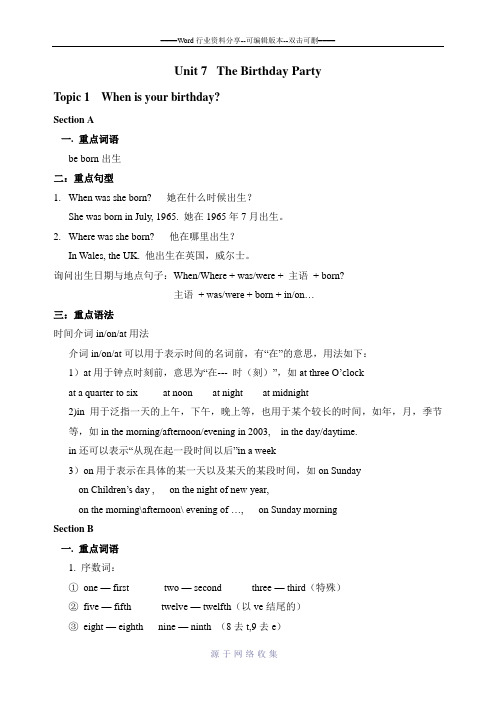
Unit 7 The Birthday PartyTopic 1 When is your birthday?Section A一. 重点词语be born出生二:重点句型1.When was she born? 她在什么时候出生?She was born in July, 1965. 她在1965年7月出生。
2.Where was she born? 他在哪里出生?In Wales, the UK. 他出生在英国,威尔士。
询问出生日期与地点句子:When/Where + was/were + 主语+ born?主语+ was/were + born + in/on…三:重点语法时间介词in/on/at用法介词in/on/at可以用于表示时间的名词前,有“在”的意思,用法如下:1)at用于钟点时刻前,意思为“在--- 时(刻)”,如at three O’clockat a quarter to six at noon at night at midnight2)in 用于泛指一天的上午,下午,晚上等,也用于某个较长的时间,如年,月,季节等,如in the morning/afternoon/evening in 2003, in the day/daytime.in还可以表示“从现在起一段时间以后”in a week3)on用于表示在具体的某一天以及某天的某段时间,如on Sundayon Children’s day , on the night of new year,on the morning\afternoon\ evening of …,on Sunday morningSection B一. 重点词语1. 序数词:①one — first two — second three — third(特殊)②five — fifth twelve — twelfth(以ve结尾的)③eight — eighth nine — ninth (8去t,9去e)④twenty—twentieth thirty—thirtieth ninety—ninetieth(以ty结尾)⑤four—fourth fifteen—fifteenth one hundred—one hundredth(一般情况)2. plan/want to do sth:计划/想要做某事二:重点句型1.When is your birthday? 你的生日是什么时候?= When were you born?2.What’s the date today? 今天几号?三:重点语法序数词变化规则1) 序数词1━19 除第一,第二,第三,第五,第八,第九, 第十二变化不规则外, 其余均由在基数词后加上-th。
七年级英语下册Unit7TheBirthdayParty综合讲解仁爱版

Unit 7 重点词语解析Unit 7 讲义要点综合解析英语百问:小灵通,what time和when都能够用于对时刻进行提问,它们之间有区别吗?小灵通: what time和when二者各有偏重。
wh at time特指几点几分,问的是具体的时刻;when那么不同,它问的是一个大体的时刻概念。
因此它的回答能够是in 2020, this week, next year等。
英语百问: Your birthday is coming. 一句中is coming是此刻进行时结构吗?小灵通: 是的。
这是此刻进行时的一种用法:用此刻进行时表示以后。
go, come, leave等动词有此种用法。
如:I?蒺m going to Hefei tomorrow. 明天我要去合肥。
英语百问: Could you help me, plea se?中的could是can的过去式吗?小灵通:此句中的could没有过去的含义。
当表示许可时,用could比can委婉、客气。
英语百问: No, I didn?蒺t, but Helen did. 中did n?蒺t和did的用法一样吗?小灵通:不一样。
didn?蒺t是助动词did与not的缩略形式,而后面的did是实义动词do的过去式(用于代替前面提到的动作)。
英语百问: We did go to the party. 一句中的did是何用法?小灵通: did在句中表示强调,意为“确实;的确”。
如:They did go to the movie. 他们确实看了电影。
英语百问: everyone与every one读音相同,有时可互换,它们的用法有区别吗?小灵通:有。
everyo ne与everybody一样,只能指人,意为“每一个人;大伙儿”。
every one意为“每一个人或物”,既可指人也能够指物,而且后面常接of短语,而everyone后面不能够接of短语。
如:Is everyone here? 大伙儿都到了吗?(every one指人)I like every one o f these books. 这些书中的每一本书我都喜爱。
2018仁爱英语七下Unit7The Birthday Party Topic1When is your birthday语言点
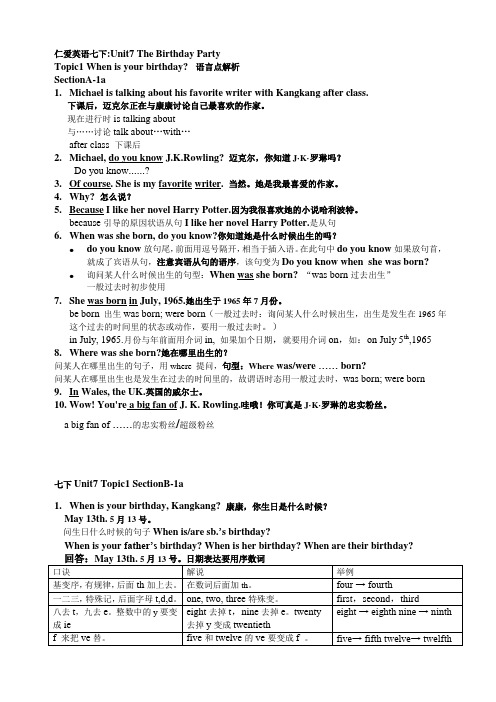
仁爱英语七下:Unit7The Birthday PartyTopic1 When is your birthday? 语言点解析SectionA-1a1.Michael is talking about his favorite writer with Kangkang after class.下课后,迈克尔正在与康康讨论自己最喜欢的作家。
现在进行时 is talking about与……讨论talk about…with…after class 下课后2.Michael, do you know J.K.Rowling? 迈克尔,你知道J·K·罗琳吗?Do you know……?3.Of course. She is my favorite writer. 当然。
她是我最喜爱的作家。
4.Why? 怎么说?5.Because I like her novel Harry Potter.因为我很喜欢她的小说哈利波特。
because引导的原因状语从句 I like her novel Harry Potter.是从句6.When was she born, do you know?你知道她是什么时候出生的吗?●do you know放句尾,前面用逗号隔开,相当于插入语。
在此句中do you know如果放句首,就成了宾语从句,注意宾语从句的语序,该句变为Do you know when she was born?●询问某人什么时候出生的句型:When was she born? “was born过去出生”一般过去时初步使用7.She was born in July, 1965.她出生于1965年7月份。
be born出生was born; were born(一般过去时:询问某人什么时候出生,出生是发生在1965年这个过去的时间里的状态或动作,要用一般过去时。
)in July, 1965.月份与年前面用介词in, 如果加个日期,就要用介词on,如:on July 5th,1965 8.Where was she born?她在哪里出生的?问某人在哪里出生的句子,用where 提问,句型:Where was/were …… born?a big fan of……的忠实粉丝/超级粉丝七下:Unit7 Topic1 SectionC-1a1.What is your present for Kangkang's birthday? 你给康康的生日礼物是什么?Guess!猜一猜2.Is it a model plane? 是飞机模型吗?No. Guess again. 不是,再猜一猜。
仁爱英语七年级下册Unit7重要短语归纳
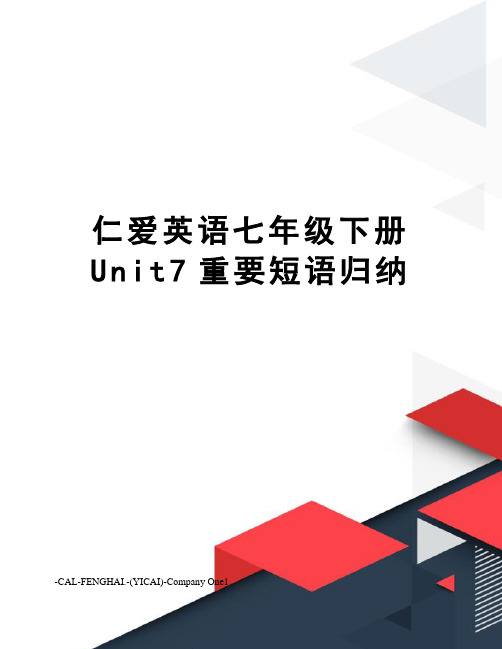
仁爱英语七年级下册U n i t7重要短语归纳-CAL-FENGHAI.-(YICAI)-Company One1Unit7 The Birthday PartyTopic 1 When were you born?重要句型1.---When were you born 你什么时候出生2.---I was born in/ on….3.---Where were you born 你什么地点出生4.---I was born in ….5.---When is your birthday 你的生日是什么时候6.--- It’s May 13th7.--- What day is it today 今天星期几8.--- It’s Monday9.---What’s the date today 今天几月几号10.--- It’s May 2nd.6. --- How do you plan to celebrate it 你打算怎么庆祝--- My friends want to have a birthday party for me.7. --- Would you like to come 你想参加吗--- Yes, I’d love to8. --- What’s your present for Kangkang’s birthday 给康康的生日礼物是什么9. --- What shape is it = What’s the shape of it 它是什么形状--- It’s round/ a circle.10.---How long/ wide is it 它多长/多宽--- It’s 10 centimeters long/wide. 它10厘米长/宽11.---What do we use it for 我们用它来做什么--- We use it to keep pencils 我们用它来放铅笔= We use it for keeping pencils12.--- What is it like 它像什么 --- What was it like before 它以前像什么 --- It’s like a star 它像一颗星星 --- It was like a flower 它像一朵花13.--- What`s your favorite present 你最喜欢的礼物是什么短语1. talk about 谈论2. know about 认识,了解3. my favorite sports star 我最喜欢的体育明星4. be born 出生(通常用过去式 was/were born)5. a big fan of sb 某人的超级粉丝6. May 13th读成May (the) thirteenth13th May 读成the thirteenth of MayYour birthday is coming 你的生日即将到来7 . next Tuesday/ year/ week 下个星期二/明年/下周8. plan to do sth 打算/准备做某事9. let me look at the calendar 让我看一下日历10. have a birthday party 举办生日聚会11. Two thousand 200012. a model plane 一个飞机模型14. Guess again 再猜一下15. What color 什么颜色16. black and white 黑白相间17. I get it = I see/know 我明白18. have a look (at sth) = look (at sth) 看一看(某物)19. have a swim=swim 游泳20. I`m afraid you can’t 恐怕你不能I’m afraid so 恐怕是这样be afraid to do sth 害怕做某事be afraid of sth 害怕某物21. look like 看起来像(外貌)be like 像…(性格,特点)22. an oval 一个椭圆形23. How wide 多宽24. How far 多远25. How long 多长26. How often 多久一次(频率)27. use sth to do sth= use sth for doing sth 用….来做…..We use it to study English . 我们用它用来学习英语28. must be 一定是 may be 也许是 can’t be 一定不是29. be planning to celebrate it 正计划着庆祝一下30. Would like to do sth = want to do sth 想要做某事31. cook a big dinner 做一顿丰盛的晚餐32. want to celebrate the birthday at home 想在家庆祝生日33. make a birthday cake 做一个生日蛋糕34. buy sth for sb = buy sb sth 为某人买某物buy some candles for her mother 想给她妈妈买些蜡烛35. buy some flowers 买一些花36. make a birthday card 做一张生日卡片37. do some cleaning/shopping 做扫除/购物38. Sing a song 唱一首歌39. In 用于表示周、月、季节、年,泛指上午、下午、晚上;in the week / in july/ in spring(春天)/ in 2008 /in the morning40. On 用于星期几,某日,某一天的上午、下午(具体某一天时,常用on) on Monday/ on April 1st / on Sunday morning/ on the afternoon of that dayTopic 2 Can you dance the disco or perform ballet?重要句型Can 能,会 (情态动词) + 动词原形1. I can play basketball.(否定句) I can’t play basketball(一般疑问句) Can you play basketball Yes, I can/ No, I can’t(选择疑问句) Can you play basketball or soccer Soccer.(特殊疑问句) What can you do?(特殊疑问句否定) What can’t you do 你不会做什么What else can you do 你还会其他什么吗=What other things can you do?2. Would like = want 想,想要 + sth/ to do sthWould you like sth = Do you want sth 你想要….吗Would you like to do sth = Do you want to do sth 你想做…..吗?What would you like = What do you want 你想要什么What would you like to do= What do you want to do 你想做什么3. 一般现在式一般过去式am wasis wasare werecan couldcan’t couldn’tI am a teacher now, but I was a student ten years agoI can fly kites very well now , but I couldn’t do it at all when I was three.表过去的时间:before, in the past, …ago, when sb was 岁=at the age of 岁, last year/month/week.短语1. Would like to do sth = want to do sth 想要做某事2. I`d like to play the piano 我想弹钢琴3. sing some songs 唱一些歌曲4. sing Chinese/English songs 唱汉语/英语歌曲5. sing with me 和我一起唱6. dance to disco 跳迪斯科舞7. perform ballet 跳芭蕾舞8. have a good time =enjoy oneself= have fun 玩得开心9. at the birthday party 在生日聚会上10. I’m sure + 句子我相信….I’m sure we will have a good time at the party.be sure to do sth 一定会做某事be sure of /about sth 相信某事11. Of course I can 当然我能12. ride a bike =ride bikes 骑自行车13. drive a car 开车14. play basketball/soccer 打篮球/踢足球(无the)play the piano 弹钢琴(有the)15. Happy birthday to you! 祝人生日快乐!16. sing an English song 唱汉语歌17. You are so smart! 你太棒了!18. count from one to ten 从一数到十19. take sth/sb to sp 把某物/人带到某地take these flowers to the party 把这些花带到聚会上去20. So many flowers 如此多花So much money 如此多的钱21. can speak English very well 英语说得很好can do it a little 会一点点can’t do it at all 一点也不会22. read English books 看英语书23. take photos=take pictures 照相take photos of sb 为某人拍照take photos with sb 和某人合影24. make model planes 做飞机模型25. do outdoor activities 做户外活动26. fly a kite= fly kites 放风筝27. ten years ago 十年前28. could dance only a little 只会跳一点点儿舞29. both like playing ball games 两个都喜欢玩球类运动both A and B A和B都both of them 他们两个都30. be good at (doing) sth 擅长…do well in 在…方面做得好Kangkang is good at playing soccer康康擅长踢足球31. have a good time =have a great time= have a nice time =have a wonderful time 玩得开心,过得愉快32. last/this/next year 去/今/明年33. When I was five = at the age of five 当我五岁时34. I could write 我能写字35. live in London 住在伦敦36. there is something wrong with ……有问题= …doesn’t/ don’t work …不能工作了There is something wrong with my computer=My computer doesn’t work.37. not …any more = no more 再也不,不再She doesn’t live here any more 她再也不住在这里了= she lives here no more38. sth be hard for sb 某事对某人来说是困难的39 . with one’s help = with the help of sbwith her mother`s help= with the help of her mother在她妈妈的帮助下40. could write many words 能写很多的字41. begin to do sth = begin doing sth 开始做某事begins to write books 开始写书42. a smart girl 一个聪明的女孩43. want to be 想成为Topic 3 We had a wonderful party一般过去时:1.概念:表示的是某个动作发生在过去的时间里,并且这个动作已经完成了。
仁爱英语七年级下册-Unit7TheBirthdayParty知识点讲解

仁爱英语七年级下册-Unit7TheBirthdayParty知识点讲解Unit 7 The Birthday PartyTopic 1 When is your birthday?Section A1.-When was she born, do you know?你知道她什么时候出⽣的?-She was born in July,1965.她出⽣在1965年7⽉。
(1) was是be动词的过去式之⼀,⽤于⼀般过去时,表⽰过去发⽣的动作或存在的状态。
通常be动词有如下形式变化:be动词的过去式⽤法与am, is, are在各种句式中的⽤法⼀致。
如:I was on duty yesterday. 昨天我值⽇。
They were at home just now. 刚才他们在家⾥。
-Was it Sunday yesterday? 昨天是星期天吗?-No, it wasn't. /Yes, it was.不,不是。
/是,它是。
-Where were you last night? 昨天晚上你在哪J巨-I was in the classroom.我在教室⾥。
-( 2 ) be born意为“出⽣,出世”。
当说明某⼈的出⽣情况时,通常⽤⼀般过去时was born 或were born。
如:When was Tom born?Where were the twins born? 这对双胞胎在什么地⽅出⽣?Were you born in January? 你出⽣在⼀⽉份吗?Michael Jordan was born on February 17th, 1963.迈克尔·乔丹出⽣于1963年2⽉17⽇。
【拓展】be born的其他常见固定⽤法: He was born of/to German parents.他的⽣⾝⽗母是德国⼈。
Alice was born into a very musical family.爱丽丝⽣于⾳乐之家。
七年级英语下册 Unit7 topic1知识点 仁爱版

Unit 7 The Birthday Party.Topic 1 When is your birthday?一、重点单词:was\ were v.(am, is\ are的过去式)是be born adj.出生thousand num.千birthday n.生日celebrate v.庆祝party n.聚会;晚会date n.日期;约会plan v.\n.计划;打算present n.礼物,赠品shape n.形状ago adv.以前surprise n.惊奇,诧异;v.使惊奇,使诧异candle n.蜡烛do some cleaning做扫除just now刚才12个月份:January n.一月February n.二月March n.三月April n.四月May n.五月June n.六月July n.七月August n.八月September n.九月October n.十月November n.十一月December n.十二月二、词组例析:1.be born出生当表达某人出生于某时或某地时,用一般过去时was\were born.Eg:--When was he born?他什麽时候出生的?--Where were you born?你在哪里出生的?2. plan to do sth.计划做某事Eg: --How do you plan to celebrate your birthday?你打算怎样庆祝你的生日?-- I plan to have a birthday party.我打算办一个生日晚会。
She is planning to cook a special dinner for her mother.她正计划着为她妈妈做一顿特别的晚餐。
3. a moment ago= just now刚才Eg: What shape was it a moment ago?= What shape was it just now?它刚才是什麽形状?Was it like a flower just now?= Was it like a flower a moment ago?它刚才像一朵花吗?4. use----for doing sth. = use---to do sth.用----做---Eg: --What do we use it for?我们用它做什麽?--We use it to keep pencils, rulers, erasers and so on.我们用它来放铅笔、尺子、橡皮等等。
七年级英语下册Unit7TheBirthdayParty核心考点归纳素材(新版)仁爱版

Unit 7核心考点归纳【核心词汇】1. afraidafraid是形容词, 意为“害怕的, 恐惧的”。
常和系动词一起构成系表结构。
句式be afraid是afraid最常用的形式,其常见的用法有:(1)be afraid ofbe afraid of 后跟名词、代词或动名词,意为“害怕某人或某物”。
例如:Are you afraid of dogs? 你害怕狗吗?She seems very much afraid of him. 她好像很害怕他。
He is afraid of jumping. 他不敢跳。
(2)be afraid tobe afraid to 后接动词原形,意为“害怕做某事或不敢做某事”。
例如:He is afraid to fly in a plane. 他不敢坐飞机。
2. ago&before(1)ago表示“从现在起的若干时间以前”,意思是“距今……以前”,需和过去时或过去进行时连用。
before泛指“从过去起的若干时间以前”,意思是“距过去某时……以前”,常和完成时连用,尤其在间接引语中,例如:His parents died ten years ago.他父母十年前都去世了。
He said that his parents had died ten years before.他说他父母亲十年前都去世了。
I have never been there before.我以前从来没有去过那里。
(2)如果不具体表明多少时间以前,只用before不用ago,意为“从前、以前”。
before 仍以副词的形式置于被修饰语后,常与完成时或者过去时连用。
例如:Have you seen this film before? 你以前看过这部电影吗?He asked me whether I had been to the Great Wall before.他问我以前是否去过长城。
(3)表示在某一点时间或事件以前时,只用before不用ago,这种用法是将before当作介词或连词使用。
- 1、下载文档前请自行甄别文档内容的完整性,平台不提供额外的编辑、内容补充、找答案等附加服务。
- 2、"仅部分预览"的文档,不可在线预览部分如存在完整性等问题,可反馈申请退款(可完整预览的文档不适用该条件!)。
- 3、如文档侵犯您的权益,请联系客服反馈,我们会尽快为您处理(人工客服工作时间:9:00-18:30)。
Unit 7 The Birthday PartyTopic 1 When is your birthday?Section A1.-When was she born, do you know?你知道她什么时候出生的?-She was born in July,1965.她出生在1965年7月。
(1) was是be动词的过去式之一,用于一般过去时,表示过去发生的动作或存在的状态。
通常be动词有如下形式变化:be动词的过去式用法与am, is, are在各种句式中的用法一致。
如:I was on duty yesterday. 昨天我值日。
They were at home just now. 刚才他们在家里。
-Was it Sunday yesterday? 昨天是星期天吗?-No, it wasn't. /Yes, it was.不,不是。
/是,它是。
-Where were you last night? 昨天晚上你在哪J巨-I was in the classroom.我在教室里。
-( 2 ) be born意为“出生,出世”。
当说明某人的出生情况时,通常用一般过去时was born 或were born。
如:When was Tom born?Where were the twins born? 这对双胞胎在什么地方出生?Were you born in January? 你出生在一月份吗?Michael Jordan was born on February 17th, 1963.迈克尔·乔丹出生于1963年2月17日。
【拓展】be born的其他常见固定用法:He was born of/to German parents.他的生身父母是德国人。
Alice was born into a very musical family.爱丽丝生于音乐之家。
he born to do/be sth.意为“天生适合从事(某项工作活动)”。
如:James was born to be a basketball player. 詹姆斯天生就是篮球运动员的料。
2. You're a big fan of J. K. Rowling.你真是J. K.罗琳的超级粉丝。
fan名词,意为“(某一运动、名人或表演艺术等的)崇拜者;……迷”。
如:a football fan足球迷He is big fan of Michael Jackson.他是迈克尔·杰克逊的热烈崇拜者。
【拓展】fan作为名词,还意为“风扇;扇子”。
如:Rick cools himself in front of an electric fan.瑞克在一个电扇前面乘凉。
3.英语日期的读法、写法关于四位数年份的读法有下列几种情形:(1)一般情况下,将表示年份的四个数字按前后分为两组,每一组的数字都按基数词来读。
如:1865年读作eighteen sixty-five2019年读作nineteen ninety-eight(2)如果前两个数字为非“零”数字,后两位数分别为“零”,则先读出前两位数,然后将后面的两个“零”读为hundred。
如:1900年读作nineteen hundred1800年读作eighteen hundred(3)第三个数字为“零,’(其他数字不是“零,’)的年份的读法应当将该“零”读为o /au/。
如:1809年读作eighteen 0 nine(4)关于千年的一些读法。
2019年读作two thousand2019年读作two thousand and eight(或twenty O eight)1008年读作one thousand and eight (ten o eight)注意:还有一些非四位数的年份,它们有两种读法:一种是按照基数词的方法来读,另一种是一个一个数字来读。
例如:531 BC读作five three one BC(或five hundred and thirty-one BC)Section B1. -When is your birthday, Kangkang? 康康,你的生日是什么时候?-May 13th. 5月13号。
英语中日期有以下两种表示法:(1)美式写法:月份+日期十年份。
如:May 21st, 2019 2019年5月21日读作:May(the) twenty-first, two thousand and one(2)英式写法:日期+月份+年份。
如:25th May, 2019 2019年5月25日读作:the twenty-fifth of May, two thousand and one注意:年份和月份之前的逗号不能省去。
2. -What's the date today?今天几号?-It's May 8th. 5月8号。
询问日期与询问星期一样,回答一般用it。
在询问过去日期时,谓语动词用was,但在询问未来的日期时,常用一般现在时。
如:-What's the date tomorrow? 明天是几号?-It's June 6th. 6月6号。
-What was the date yesterday? 昨天是几号?-It was September 8th, 2019. 2019年9月8号。
3. Oh, your birthday is coming.噢,你的生日就要到了。
be coming意为“就要来到了”,是现在进行时表示即将发生的动作。
运用于这种句式的动词还有go(去),leave(离开),arrive(到达)等。
如:Mr. White is going to London next week.怀特先生下周要去伦敦。
The train for Beijing is leaving.开往北京的火车就要发车了。
The bus is arriving at 3:00 p. m.汽车下午三点钟到达。
4. How do you plan to celebrate it? 你打算怎样庆祝它?( 1 ) plan v.在此句中意为“计划、打算”,用法如下:【拓展】plan n.计划,打算如:Do you have any plans for the summer? 这个夏天你有什么打算?(2)celebrate: v.意为“庆祝,举行(仪式、庆典)”。
如:We celebrated Kangkang's birthday with a party.我们开了个聚会来庆祝康康的生日。
【拓展】①celebration n.庆祝,庆典。
如:We plan to have a celebration to celebrate her birthday.我们计划开个庆祝会来庆祝她的生日。
2 celebrated adj.有名的,著名的,大名鼎鼎的。
如:He is a celebrated novelist.他是一位著名的刁锐家。
5.序数词(1)定义:表示顺序的词,往往与定冠词the连用。
(2)构成规则①“第一”到“第十九”:其中first, second, third, fifth, eighth, ninth, twelfth为特殊形式;其他序数词都是由相对应的基数词后添加“th"构成,如:seventeen-seventeenth。
②“第二十”到“第九十九”:整数第几十须变结尾字母Y为i,加“eth”构成。
如: twenty-twentieth。
表示“第几十几”时,用几十几的基数词形式加连字符“-”和个位序数词形式一起表示。
如:sixty-fifth第六十五。
③“第一百”以上的序数词:将基数词的形式变结尾部分为序数词形式。
如:One hundred and thirty-first第一百三十一(3)缩写形式first-1st second-2nd third-3rdfourth-4th twenty-first-21sttwenty-sixth-26th(4)句法功能①在句中作主语。
如:The second is better than others.第二个比其他的都好。
②在句中作宾语。
如:He chooses the third.他选了第三个。
③在句中作定语。
如:October is the tenth month of a year.十月是一年中第十个月份。
④在句中作表语。
如:Tom was the second last year.汤姆去年是第二。
6. -Would you like to come?你愿意来吗?-Yes, I'd love to. Thank you.是的,我很乐意。
谢谢。
would like意为“想,想要”,与“want”意义相同,但语气更加委婉,其后都跟to do的形式。
邀请他人所用到的其它句型:(I)What/How about+v-ing?(2)Why not/don't you+动词原形?(3)Shall I (we)/Will you+动词原形?(4)May I invite you to+动词原形?如: (I)-What/How about going hiking with us? 去徒步旅行怎么样?-Sounds good.听起来不错。
(2)-Why not/don't you join us? 为什么不加人我们?-Good idea好主意。
(3)-Will you join us? 要加人我们吗?-Yes, I'd love to.好呀,我很乐意。
(4)-May I invite you to join us? 我可以邀请你加人我们吗?-Thank you for inviting me. 谢谢你邀请我。
Section C1. -Mm, what's the shape of your present? 嗯,你的礼物是什么形状的?-It's round.它是圆的。
( 1 ) "What's the shape of ...?”意为“……是什么形状的?’,,还可用“What shape is...?”来表达。
用来询问物体的形状。
如:-What's the shape of the pencil-box?这个铅笔盒是什么形状的?-It's a rectangle.它是长方形的。
-What shape is the ball? 这个球是什么形状的?-It's round.它是圆的。
(2 ) round在此处是形容词,作表语,意为“圆的,球形的”。
